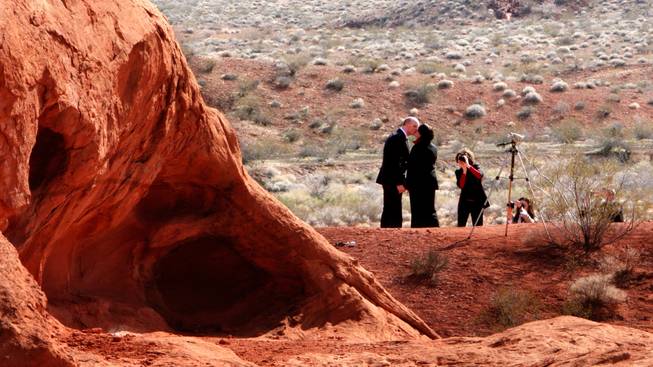
Joe Elbert / Las Vegas Sun
Nina Kornblum and Alexander Kraft of Germany have their wedding day photographs taken Tuesday at Valley of Fire State Park, an hour north of Las Vegas. The state’s parks could close if a budget-cutting idea of state Sen. Steven Horsford is enacted by the Legislature.
Wednesday, Feb. 17, 2010 | 2 a.m.
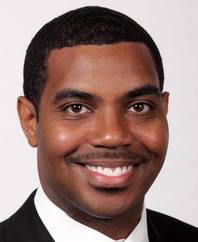
Steven Horsford
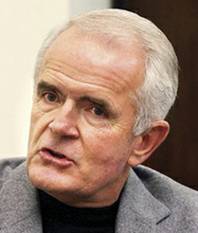
Gov. Jim Gibbons
Related Documents (.pdf)
Sun Archives
- Hundreds attend town hall meeting to weigh in on state budget crisis (2-13-2010)
- Gibbons seems to be backsliding on pledge to not raise taxes (2-13-2010)
- Two Democrats break ranks, call for state tax hikes (2-13-2010)
- Gibbons to sign proclamation Tuesday calling for special session (2-12-2010)
- Crackdown on uninsured drivers weighed to help fill state budget gap (2-11-2010)
- Governor plans emergency address on Nevada budget (2-7-2010)
- Governor’s speech will lay out state’s budget problems (2-7-2010)
- State budget comes up $800 million short (1-22-2010)
- Forecast: Economy will begin to rebound in mid-2011 (1-22-2010)
- Gibbons’ no-talk order further divides branches (1-22-2010)
- Special session may require help of state Supreme Court (1-10-2010)
The Nevada Legislature is thinking of closing state parks as it considers how to patch an estimated $900 million budget gap, a move that would save a few million dollars while killing the economies of rural towns and stunting tourism efforts across the state, opponents of the idea say.
Gov. Jim Gibbons has suggested a 10 percent budget reduction for a number of agencies, including the State Parks Division. But the Interim Finance Committee could take that a step further. At its meeting in Las Vegas on Thursday, the committee is expected to consider following the lead of cash-strapped states such as California and Arizona, that have closed some or all of their state parks.
In Nevada, the proposal is the brainchild of Senate Majority Leader Steven Horsford, D-Las Vegas, who says he is considering shutting down all state parks to save money. He said teachers and other primary services are more important than recreation.
“It’s part of our quality of life, but the choice is between doing that or thousands of teachers laid off statewide, which is bad for education, bad for schools and bad for the economy,” he says. He estimated that about $8 million over the biennium could be saved. The parks division gets $5.3 million a year from the general fund.
Conservationists, outdoor enthusiasts, parks experts and the governor all consider park closures unnecessary. Gibbons figures the cuts can and should come from elsewhere.
“The governor believes parks play an important role in life in Nevada and they’re huge tourist attractions,” Gibbons’ spokesman Dan Burns says. “His highest priorities are getting more tourists and making jobs, and the governor would not be in favor of closing tourist attractions.”
The Nevada Conservation League and other environmental groups worry that endangered species will be lost, parks will be trashed and that the closures could worsen quality of life for the stressed-out populace.
“You have record unemployment and foreclosure in Nevada and you’re talking about taking away places where folks can go to get away from stress in their daily lives,” National Association of State Park Directors Executive Director Phillip McKnelly says. “You look at all the impacts and you’ll see this is one of the worst possible times to close parks.”
In Nevada, such closures would particularly hurt rural towns near state parks and slow Las Vegas’ budding eco-tourism efforts, parks experts warn. States that have closed state or national parks in the past say it had huge economic consequences for rural communities. Closures also leave cultural and historical sites and artifacts vulnerable to theft and vandalism and strain law enforcement agencies.
Horsford said that parks that are “entirely fee supported” could be excluded from his plan. He said there are two such parks but did not identify them.
The two most popular parks are Valley of Fire State Park, an hour north of Las Vegas near Overton, and Lake Tahoe-Nevada State Park, in Northern Nevada. Both are net earners — but they’re not “entirely fee-supported,” parks experts say.
Those two parks do, however, have significant economic effects on surrounding communities.
Valley of Fire, famous for its Native American petroglyphs and dramatic scenery, is a large tourism draw. About 65 percent of its visitors are from other states or countries. Many stay in the Las Vegas Valley and visit the park on tours. It’s also one of the state’s most popular wedding sites as well as for filming commercials and movies, Nevada State Parks Division Administrator David Morrow says. He estimates private Nevada companies generate about $9 million from activities in Valley of Fire.
Laughlin recently passed a bond measure to improve the campground at its nearby state park, Big Bend. The park is popular with RV-driving snowbirds who often spend part or all of winter living in the park, enjoying the relatively warm weather along with nearby casinos.
The bond financing would have to be repaid, whether the park stays open or not.
“If you close the parks, not only do you take the visitor economy away, you affect private businesses over all of Southern Nevada,” Morrow says.
That’s one of the reasons why experts argue that closing parks would be a money-loser for the state.
Though most parks don’t make a net profit, they have profound effects on the economies of rural communities. A 2003 state-sponsored study found that Nevada’s state parks generate about $62 million in income for the state, both from fees or through visitor spending in nearby towns.
That’s a great return on the $5.3 million the state sends from the general fund each year, Morrow says.
If the governor’s proposed 10 percent budget cut is enacted, Morrow will have seen his budget slashed by about 45 percent in the past four years. Yet the parks remain open and visitation is up. Nevada parks now get more than 3 million total visitors each year, he says.
And visitors pay not just for access to the parks, but also for guided tours, gasoline, rental cars, hotels, meals and souvenirs, says Daniel McLean, the Southern Nevada vice president of the state’s Recreation and Parks Society, also a recreation and sports management professor at UNLV.
“The impact is the same in most park systems across the country,” McLean says. “For every dollar spent on that park, that dollar goes back into the economy multiple times. It can generate 15 to 20 dollars for the local economy. You take that out of rural areas and you’ve got a significant impact.”
Just ask Arizona.
The state has a history of devastating park closures. In 1996, national parks across the country were temporarily shuttered due to economic distress. The state kept Grand Canyon National Park open though, because Arizona concluded that even a temporary closure of that park would devastate the state’s tourism industry.
A 1997 federal study on the economic effect of the closures found it had wiped out small towns.
Still, Arizona’s parks board recently closed eight parks, most of them in disrepair after years of deferred maintenance, agency Executive Director Renee Bahl says. Thirteen more parks will be closed by June, and the nine left will only stay open if the board can raise $3 million this year to pay for them.
That has caused Arizona’s state park fees to skyrocket, increasing from 20 percent to 100 percent.
Meanwhile, rural towns near closed and closing parks are facing economic calamity. With the recession, income from parks visitors was a growth area for rural towns as urban families sought low-cost, short-travel vacations.
A plan to close state parks in California causes so much contention there that Gov. Arnold Schwarzenegger spiked the proposal and guaranteed the parks department baseline funding indefinitely. His state parks department took a one-time $14 million budget hit this year, plus mandated state employee furloughs. That forced parks to reduce hours and maintenance but they remain open.
States nationwide are scrambling to get their parks off the government dole, McKnelly says. Idaho tried to push its state parks off onto its counties and is now talking about turning them over to a landholding agency. Arizona is trying to get a ballot measure passed to add a $9 charge to each vehicle registration fee to fund parks. Montana and Washington do something similar to that. Oregon and Colorado get funding from the state-sponsored lottery. Arkansas and Missouri have a sales tax that goes to parks, and Florida and North Carolina parks get money from a land transfer tax.
“Every state parks director in the nation is looking at alternative funding,” McLean said. “The challenge here is finding alternative revenue sources that are palatable to politicians and to the public. Everybody is clamoring for additional funding sources right now.”
There’s also the issue of losing the investment poured into these parks over the past 75 years, experts warn. No state has ever closed an entire parks system, Bahl says, and in Arizona, they’re having a hard time figuring out how to preserve historic sites, artifacts and critical habitat in parks with no staff.
Nevada parks are filled with priceless historic artifacts, buildings and petroglyphs and countless endangered species, and the park system’s infrastructure alone is worth about $164 million.
Padlocking the gates and walking away isn’t going to protect all that.
A leak in one roof could eventually destroy an entire building, abandoned trails can cause erosion and water pollution in nearby streams. Most parks, including the Valley of Fire, can’t be fenced in, providing easy access for vandals, thieves, poachers and meth-heads putting everything from buildings to archeological artifacts in danger.
A closure of even one year could cause a park to degrade so much that it would take years and millions more dollars to recover — and that’s just the stuff you can replace, parks experts note.
“We protect and preserve some of the state’s most important cultural, historic and recreational resources,” Morrow says. “There’s no way to replace those things if they’re lost or destroyed. For a very small amount of money, in terms of general fund contributions, the state gets a huge economic return ... For 75 years we’ve preserved and taken care of these places and you’re tossing that out the window if you close them.”
Sun reporter David McGrath Schwartz contributed to this story from Carson City.
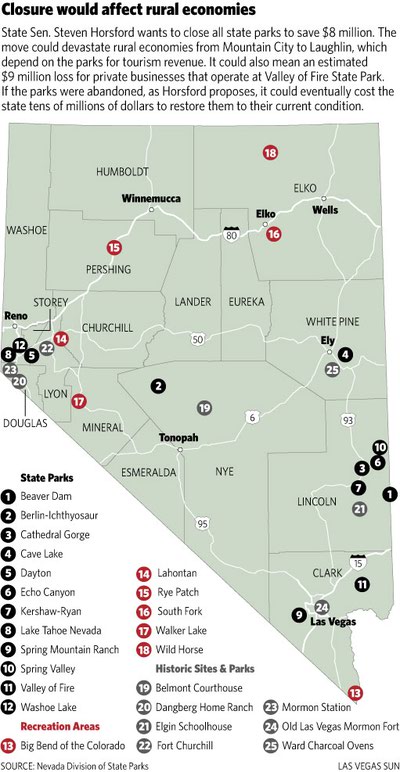
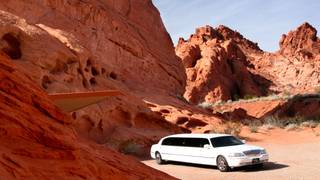

Join the Discussion:
Check this out for a full explanation of our conversion to the LiveFyre commenting system and instructions on how to sign up for an account.
Full comments policy